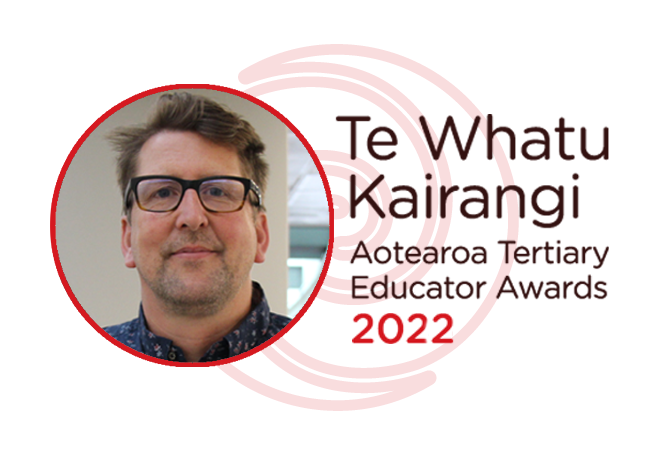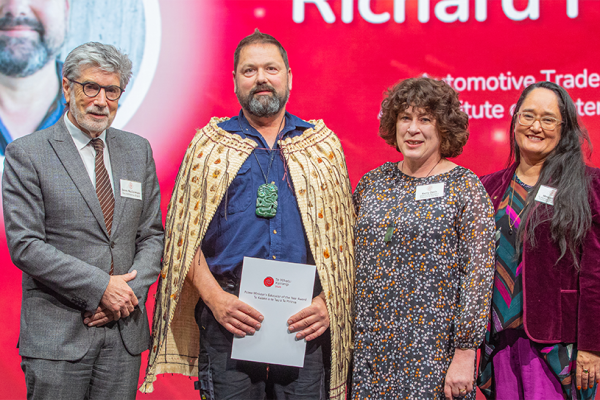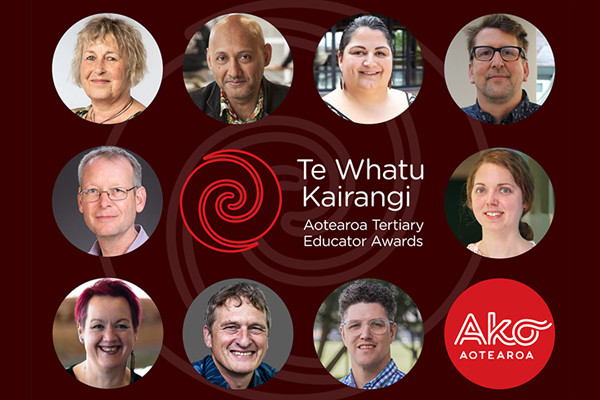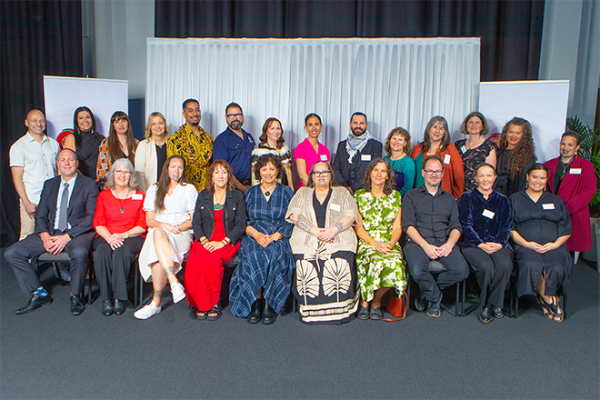Christian Schott
Leading the VR experience in tourism teaching and learning
Category winner | Innovation in learning, teaching, and curriculum
Associate Professor, Tourism Management | Te Herenga Waka | Victoria University Wellington
Watch Christian Schott's Teaching profile video
“My teaching is centred on student needs, a passionate emphasis on experiential forms of learning, the deep desire to meaningfully engage ākonga, a passion to foster learning that is relevant and accessible by situating it in the ‘real world’, and a celebration of diversity in backgrounds, perspectives, and approaches”
Christian’s journey as a Tourism Management educator at Te Herenga Waka—Victoria University of Wellington started in 2002, straight after submitting his PhD in Human Geography. Initially adopting the Commerce Faculty’s course design formula of ‘lectures-essay-lectures-essay-lectures-exam’, he soon realised his students were struggling with this approach and needed to understand complex concepts and apply them in diverse tourism contexts. This led him to reflect on and explore new ways to better engage with and support his Tourism Management students. His teaching is now centred on the needs of students, on meaningfully engaging ākonga with the topic as well as learning culture, on fostering relevant and accessible learning by situating it in the ‘real world’, and on celebrating diversity in backgrounds, perspectives, and approaches. Christian’s ako philosophy strongly aligns with objectives in the Tertiary Education Strategy (TES) 2020, which emphasises the need for students to have an inclusive experience of learning with access barriers minimised.
Christian’s ako (learning and teaching) philosophy is grounded in countless kōrero with students and alumni, deep pedagogical discussions with colleagues, research on the impact of his teaching, as well as continuous reflection on learning and teaching scholarship within the tourism field and beyond. In consciously distinguishing between ‘mindset’ and ‘skillset’ learning outcomes across his courses, Christian encourages a sustainability/kaitiakitanga mindset, critical as well as creative thinking skills, and emotional intelligence. In supporting his students to achieve all four outcomes, he develops project-based assessments that help ākonga weave together material from different parts of the course, explore different perspectives, and think critically and creatively. He also designs tasks that expose them to the “messiness” of the ‘real world’, such as asking ākonga to conduct assignment-focused fieldwork on the digitally replicated Fijian island of Yasawa or the Peruvian town of Machu Picchu Pueblo. Using this approach, he transformed a struggling 100-level course, Tourism in New Zealand, making it more relevant and accessible. When he was made its sole course coordinator and teacher in 2018, he redesigned the course around three of his ako philosophy’s building blocks - engaging learners, innovating, and making learning accessible and relevant.
Christian’s development of a virtual reality (VR) learning tool was inspired by positive student response to his use of music, quizzes, and Google Earth visits to global tourism hotspots, which helped students understand topics such climate change in the context of a place and its people. He found the holistic learning tool helped ākonga understand the importance of context, as well as the tensions between social, cultural, environmental, and economic elements. He worked with two Fijian communities on Yasawa Island to develop VR content that enabled students to learn about their customs and cultural values and to realise that they needed to understand the crucial social and cultural context to achieve sustainable tourism. Building on the success of the original, non-immersive VR learning tool, he used VR headsets to immerse learners more fully in the sights and sounds of the Fijian island. In collaboration with Professor Stephen Marshall, he also initiated a project to explore the potential of immersive VR to support experiential education pedagogy, developing the pedagogical concept of ‘Virtual Reality Situated Experiential Education Environments’ (VRSEEE). This is a framework he continues to use to ensure learning tools are inclusive and effective.
Christian continues to look for ways to refine his teaching and courses. Although he values workshops and educational literature, he finds the strongest influence on his teaching design and practice is kōrero with ākonga and colleagues. When developing a minor in Business Ethics and Sustainable Management, he established a student focus group and utilises feedback from students from ‘AKO in Action’, a voluntary programme where students from other programmes partner with lecturers to give feedback on their course design. He also benefits from learning and teaching discussions as TEFI Vice-Chair (2013-2015) and convenor of his school’s Learning and Teaching Committee (2014-2016).
Although Christian’s primary impact is on students’ learning, his approach has also benefited the Fijian communities of Yasawa-I-Rara and Bukama. With his students and colleagues, he supported the development of a village library and the replenishing of stationery supplies for their kindergarten and school. Due to the success of the Fijian learning tool, Christian and the multi-disciplinary project team he leads received a Centre for Asia-Pacific Excellence (CAPE) grant in 2019 to apply the concept of VRSEEE to foster social studies education in secondary schools. This pilot project used cutting edge VR technology to support social studies education about Machu Picchu Pueblo and to examine the impacts of immersive VR learning tools on students and teachers. He sees the impact of this mahi as supporting research-informed school education and helping learners to appreciate the crucial need to consciously manage tourism in Aotearoa and elsewhere. His team also developed a more accessible, non-immersive version of the Machu Picchu Pueblo Learning Tool that has been downloaded by teachers in Aotearoa, Australia, Ecuador, USA, and Vanuatu. The next step is to democratise access to this learning tool so it can be used even more widely.
The impact of Christian’s VR Situated Experiential Education has been recognised through international awards. In 2018, he was awarded the ‘AACSB Innovations that Inspire’ honour for the Fijian VR learning tool by the AACSB Global Business Education Network and, in 2019, he received the Bronze Award Oceania from Wharton-QS Reimagine Education Awards, which acknowledged the innovative approach behind his two learning tools and their impact on ākonga. Beyond the university, Christian served as Vice-Chair of TEFI, a global network of 550 progressive tourism educators. During this time, he organised two international conferences, co-edited a book and two special issues, and signed a Memorandum of Understanding with
the World Indigenous Tourism Alliance. He also initiated Masters’ scholarships to attend TEFI conferences and a collegial scholarly process that reframed ‘reviewers’ as mentors. His teaching approach has led to international teaching invitations at universities in Canada and Vanuatu. In 2018, he was invited to speak on ‘Simulation in Business Education’ at the AACSB Asia Pacific Conference in Seoul and gave a panel address at the other premier accreditation body’s (EFMD) 2019 Annual Conference in Copenhagen. This led to presentations and collaborative projects both in New Zealand and overseas. He has co-authored five journal articles, a book chapter, two journal editorials, and more than 15 conference presentations related to his educational approach. The most significant acknowledgement of his leadership and collaboration occurred in 2020 when the multi-disciplinary project team he led was awarded the prestigious Sustainability Gold Award from Wharton-QS Reimagine Education.
“Both the school and university-based adoption of my learning tools and the uptake from colleagues around the world demonstrate the inclusive nature of this approach, and its ability to adjust to changing societal and educational landscapes.”



